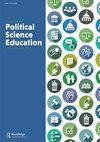The (Coffee) Grounds of Change: An Experiential Learning Approach to Sustainable Development
IF 0.6
Q3 POLITICAL SCIENCE
引用次数: 0
Abstract
Abstract Drawing on six years of experience teaching Political Science classes with field experiences in the Dominican Republic, I discuss the design and implementation of effective sustainable development projects. What started as a one-off field experience has grown into a long-term relationship with the coffee growing community of El Naranjito, which provides opportunities for students to learn through purchasing our campus coffee and collaborating with producers on navigating the international specialty market. Beyond efforts to assist farmers raise their standard of living through the sale of their primary commodity, students are also involved in projects addressing quality of life issues, such as access to reliable, affordable solar energy and safe drinking water—all funded from profits of our College-branded Warrior Coffee. Discussion includes learning objectives specific to Political Science and how an intentionally crafted experience can assist in the development of students’ cultural competence, global awareness, and soft skills—including effective communication, teamwork, and resilience. Finally, special attention is paid to the importance of building collaborative, mutually beneficial relationships with host communities in order to ensure sustainable economic and community development that seeks to avoid dependency and neocolonial power dynamics. The lessons learned can be applied to other contexts.改变的(咖啡)理由:可持续发展的体验式学习方法
基于我在多米尼加共和国教授政治学课程6年的经验和实地经验,我讨论了有效的可持续发展项目的设计和实施。最初的一次性实地体验已经发展成为与El Naranjito咖啡种植社区的长期合作关系,该社区为学生提供了通过购买我们的校园咖啡和与生产商合作导航国际专业市场的机会。除了努力帮助农民通过销售他们的主要商品来提高他们的生活水平外,学生们还参与了解决生活质量问题的项目,例如获得可靠、负担得起的太阳能和安全的饮用水——所有这些项目的资金都来自我们大学品牌的勇士咖啡的利润。讨论内容包括政治科学的具体学习目标,以及精心设计的经验如何帮助学生培养文化能力、全球意识和软技能,包括有效的沟通、团队合作和应变能力。最后,特别注意与东道社区建立合作互利关系的重要性,以确保寻求避免依赖和新殖民主义权力动态的可持续经济和社区发展。吸取的经验教训可以应用于其他情况。
本文章由计算机程序翻译,如有差异,请以英文原文为准。
求助全文
约1分钟内获得全文
求助全文
来源期刊

Journal of Political Science Education
POLITICAL SCIENCE-
CiteScore
1.80
自引率
36.40%
发文量
69
期刊介绍:
The Journal of Political Science Education is an intellectually rigorous, path-breaking, agenda-setting journal that publishes the highest quality scholarship on teaching and pedagogical issues in political science. The journal aims to represent the full range of questions, issues and approaches regarding political science education, including teaching-related issues, methods and techniques, learning/teaching activities and devices, educational assessment in political science, graduate education, and curriculum development. In particular, the journal''s Editors welcome studies that reflect the scholarship of teaching and learning, or works that would be informative and/or of practical use to the readers of the Journal of Political Science Education , and address topics in an empirical way, making use of the techniques that political scientists use in their own substantive research.
 求助内容:
求助内容: 应助结果提醒方式:
应助结果提醒方式:


